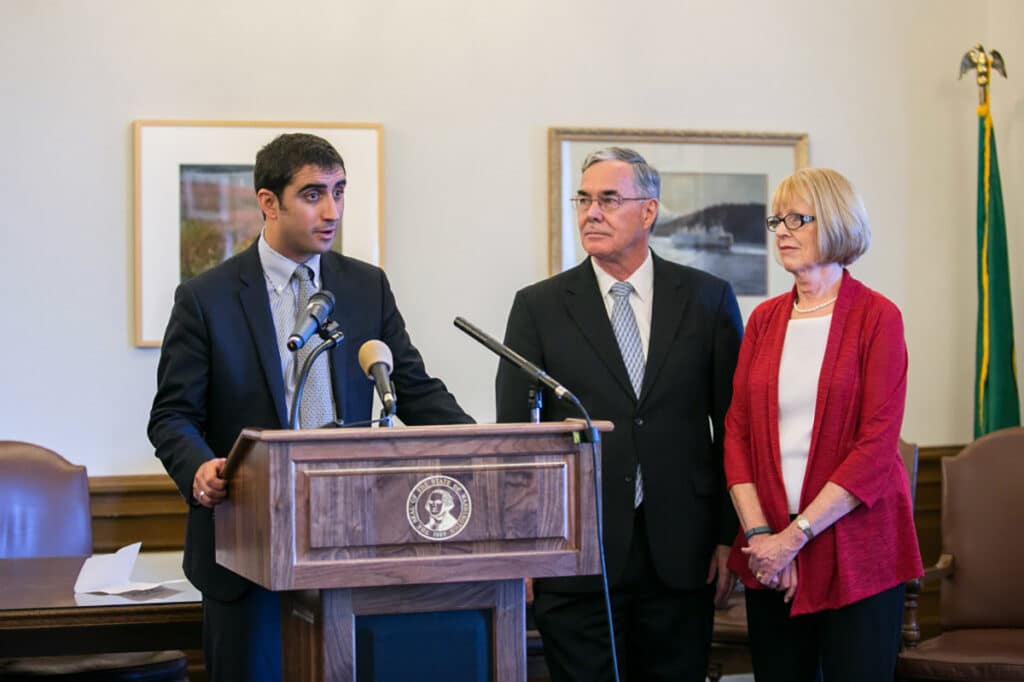Community Health & Wellness
Joel’s Law advocates seek expansion of law governing involuntary mental health treatment
Months after his son’s funeral, Doug Reuter flew to Washington to attend an all-day meeting of the state House Committee on Health Care in Olympia. When they broke for lunch, The former Minnesota state representative introduced himself to one of the members.
Health & Wellness Sponsor
Health and Wellness stories are made possible in part by Virginia Mason Franciscan Health, a proud sponsor of Gig Harbor Now.
“I asked him if I could intrude on his lunch and tell him the story about Joel,” Doug recalled of the meeting 12 years ago. “How we weren’t able to get him help.”
That was the beginning of a push by Doug and his wife, Nancy, to get the state to adopt what is now called Joel’s Law. Joel’s Law was an expansion of Washington’s Involuntary Treatment Act giving immediate family members the authority to request their loved ones be detained for up to five days due to a severe mental illness.

Doug and Nancy Reuter stand with then-Rep. Brady Walkinshaw, a sponsor of Joel’s Law, in 2015. Provided by Washington State House Democrats.
A decade later – calling from their Texas home after seeing a story published by the Kitsap Sun and Gig Harbor Now last month about the growing use of Joel’s Law — the couple is hoping political will exists to expand the law and make it more accessible to everyone, not just immediate family members.
Joel Reuter
Washington adopting Joel’s Law was a victory for the Reuters. They had unsuccessfully tried dozens of times to get their son help for his untreated mental health condition before his death.
Police fatally shot Joel, a 28-year-old software engineer living in Seattle, in 2013 following an hours-long stand-off, according to media reports. He was experiencing a behavioral health crisis at the time.
The couple wanted their son, who had been diagnosed with bipolar disorder, to be involuntarily detained and examined by a medical professional. Like many people with serious mental illnesses, Joel had anosognosia, his parents said, meaning he did not recognize that he was sick and often refused medication.
Doug and Nancy asked authorities to detain Joel a couple dozen times while he attended college in Arizona. That system worked, they say. Their son was referred to outpatient treatment, started taking medications and stabilized. In Washington, things were more difficult. Doug and Nancy documented 48 times they or Joel’s friends pleaded for help from authorities.
At the time, only designated crisis responders, mental health professionals serving as a bridge between the medical system and the courts, had the authority to involuntarily detain someone. Some parents of children with serious mental illnesses said that often meant they couldn’t get help until law enforcement got involved.
Family can request involuntary treatment
Joel’s Law, which passed the Legislature with overwhelming support in 2015, changed that. The law gave immediate family members legal standing to file a petition with a superior court judge asking for a loved one to be detained due to the severity of a behavioral health condition. Those petitions can include a more comprehensive look at someone’s history than what a designated crisis responder can necessarily see in the moment.
When a judge grants a Joel’s Law petition, the same process follows as when a designated crisis responder detains someone. They are held for a maximum of 120 hours (plus holidays and weekends). During that period a mental health professional decides if they need to be committed for longer or referred to treatment.
Petitions filed under Joel’s Law comprise only a small portion of all involuntary detainments in Washington, but the number of cases involving the petitions has increased statewide by 266% since 2020, according to reporting from the Kitsap Sun and Gig Harbor Now.
Excluding members of indigenous communities, only immediate family can ask for someone’s detainment under Joel’s Law. Friends or extended family members are barred from filing these petitions.
The Reuters agreed to that stipulation in 2015. Yet they continue to argue the law should be expanded to allow anyone with knowledge of the person, under the penalty of perjury, to petition for detainment.
“When we finally agreed to immediate family only it was because I read the political tea leaves,” Doug said. “I could not get the language passed. There was enough objection to anyone being able to file a Joel’s Law petition.”
‘He had friends’
Now that the law is 10 years old and people are more comfortable with it, Doug and Nancy hope political will exists for it to expand. Joel, they point out, had many friends in Seattle who were aware of his deteriorating condition, but under current law would not be able to file a petition.
“He had friends,” Nancy said of her son. “It wasn’t just us.”
Yet even as Joel’s Law has been embraced to some degree, expanding the use of involuntary commitment in any capacity is rarely without controversy. Some providers and civil rights advocates continue to question if it is the right approach.
Doug and Nancy, though, believe it could have helped their son. And they had planned on returning to Olympia in recognition of the law’s 10th anniversary, to advocate for that change. It felt like an opportune time, they said.
Unexpected circumstances prevented that trip. They remain committed to coming back at some point.
“Untreated mental illness cost our son his life,” Doug said. “We want to do what we reasonably can to make sure that doesn’t happen to anyone else.”

